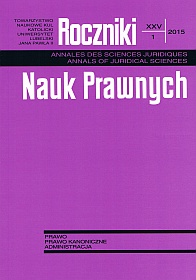Legal protection of marriage in the context of gender ideology
Abstract
In the context of an active propaganda of gender ideology, which is smuggled also in the wording of the Council of Europe Convention on preventing and combating violence against women and domestic violence out of 11 May 2011, it is reasonable to question: whether in the Polish law, marriage and family are sufficiently protected; whether they are consistently recognized as the basic forms of social life; whether citizens and Christians have a duty to further strengthening the marriage and the family; whether they can promote implementation of solutions present in gender ideology / philosophy.
To answer the question, in this article presented an analysis of the following issues: 1) the meaning of marriage and family in the Polish law; 2) characteristics of the gender ideology and its dangers; 3) the position of the Church towards gender ideology; 4) necessity of stronger protection of marriage and family rights.
The analysis of these issues leads to the following conclusions: Polish law protects marriage, children and family, but this protection is not fully consistent. Introduction to the legal order of the Council of Europe Convention on preventing and combating violence against women and domestic violence (11 May 2011) will weaken the position of traditional marriage and the family, and can eliminate their protection, which may lead to changes in the Constitution provisions , which protect marriage and the family.
In this situation as justified should be considered following actions: raising public awareness, what is the gender ideology and what want its supporters; promoting knowledge of the rights of spouses, parents and families; assisting spouses in the enjoyment of their rights; participation in the making of laws supporting spouses, parents and families in carrying out their tasks.
References
Council of Europe: Gender equality strategy 2014-2017, Luxembourg 2013.
Komisja Europejska: Podręcznik włączania równości płci w główny nurt polityki. Zatrudnienie, integracja społeczna i ochrona socjalna, Luksemburg (Urząd Oficjalnych Publikacji Wspólnot Europejskich, Dyrekcja Generalna ds. Zatrudnienia, Spraw Społecznych i Równości Szans) 2008.
Codex Iuris Canonici. Auctoritate Ioannis Pauli pp. II promulgatus. Kodeks Prawa Kanonicznego. Przekład polski zatwierdzony przez Konferencję Episkopatu. Pallottinum 1984.
Konstytucja Rzeczypospolitej Polskiej z 2 kwietnia 1997 r. Dz.U. nr 78 poz. 483.
Wytyczne Sądu Najwyższego. Prawo cywilne, pracy, rodzinne i opiekuńcze, Białystok 1993 (red. P. Piszczek; wytyczne z 1952 r.).
Kodeks rodzinny i opiekuńczy. Ustawa z dnia 25 lutego 1964 r. Dz.U. nr 9 poz. 59 (skrót: k.r.o.).
Watykan a gender: sprzeciw Benedykta XVI i milczenie Franciszka, Zamieszczone przez PAP 27 grudnia 2013 na stronie: http://wiadomosci.onet.pl/swiat/watykan-a-gender-sprzeciw-benedykta-xvi-i-milczenie-franciszka/9mpfh (dostęp 11.02.2015), s. 2.
Literatura
Alzamora Revoredo Oscar: Ideologie des Begriffs „Gender“: Gefahr und Tragweite, [w:] Lexikon Familiae. Mehrdeutige und umstrittene Begriffe zu Familie, Leben und ethischen Fragen, Paderborn–München–Wien–Zürich 2013, s. 310-322.
Brunetko Krzysztof, Mateja Anna: Wszystko o Ewie, red. Izabella Sariusz-Skąpska, Warszawa 2011.
Burggraf Jutta: „Gender“ (Geschlecht), [w:] Lexikon Familiae. Mehrdeutige und umstrittene Begriffe zu Familie, Leben und ethischen Fragen, Paderborn–München–Wien–Zürich 2013, s. 289-296.
Jaszczuk-Surma Małgorzata: Gender. Pełzająca rewolucja, czyli gangrena naszych czasów, „Civitas Christiana” nr 1(8) ze stycznia 2014 s. 34-35.
Jaroszyński Piotr: Gender: nauka czy ideologia, „Nad Odrą. Miesięcznik społeczno-kulturalny” 24 (2014), nr 1-3 (190-192) s.102.
Kuby Gabriele: Referat podczas V Europejskiej Konferencji z cyklu: Rodzina polska poza granicami kraju, na temat: Ocalić rodzinę = ocalić przyszłość, 24-25 marca 2011 r. w Uniwersytecie Rzeszowskim.
Kuby Gabriele: Rewolucja genderowa. Nowa ideologia seksualności, Kraków 2012.
Kuby Gabriele: Globalna rewolucja seksualna. Likwidacja wolności w imię wolności, Kraków 2013.
Nazar Mirosław: Prawo rodzinne, [w:] Zarys prawa cywilnego i rodzinnego. Lublin 1999, s. 428-433.
Oko Dariusz: Gender. Cywilizacja śmierci – historia ideologii gender (jej twórcy, podstawowe założenia ideologii gender oraz próby jej wdrażania w Polsce), Lublin 2013.
Ryś Maria: Konwencja RE aplikacją ideologii gender, „Głos dla życia” nr 2 z 2014 r.
Vollmer de Colles Beatriz: Neue Definition des Begriffs „Gender“, [w:] Lexikon Familiae. Mehrdeutige und umstrittene Begriffe zu Familie, Leben und ethischen Fragen, Paderborn–München–Wien–Zürich 2013, s. 297-309.
Copyright (c) 2015 Roczniki Nauk Prawnych

This work is licensed under a Creative Commons Attribution-NonCommercial-NoDerivatives 4.0 International License.


